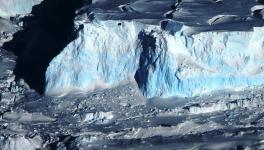Ocean Acidification can Cause Mass Extinction Like Ancient Times

Image courtesy: plantbasednews.com
The world’s oceans are becoming acidic. One of the main factors behind this is the increasing carbon emissions from the burning of coal, oil or gas. The oceans absorb the carbon emitted in those processes. Acidification of the oceans and seas above a critical level can lead to a disaster that the marine lives would have to face. In fact, an “ecological collapse” in the oceans is in the offing. This disaster is also worrisome for us. Oceans are home to the planktons, tiny plants that reside near the ocean surface and move with the current. These planktons are responsible for emitting a huge portion of oxygen worldwide. Hence, the implication of an ecological collapse is a cause of worry for all life on Earth.
A study published in the Proceeding of the National Academy of Sciences (PNAS) analysed fossils found in the Netherlands and estimated how ocean acidification during the period of Cretaceous–Paleogene (K-Pg) boundary, some 66 million years ago, caused mass extinction of marine biodiversity.
This was the period when a large meteorite hit Earth, which wiped out the dinosaurs and three-quarters of all marine species in the world. The fossil that the researchers found and analysed belonged to that period. It was the fossil of some seashells. Its chemical analysis demonstrated the fact that the chalky shells of many species were dissolved leading to eventual death as a result of the acidification of the ocean.
The meteorite impact vapourised rocks of sulphates and carbonates, the result being sulphuric acid and carbonic acid which rained down. The mass extinction of plants on land after the strike also increased carbon dioxide in the atmosphere. All these led to a rapid acidification of the oceans and as acidity increased the marine lives also had to suffer a collapse.
Michael Henehan from the GFZ German Research Centre for Geosciences in Potsdam, who led the study said, “We show ocean acidification can precipitate ecological collapse. Before we had the idea, but we did not have the empirical proof.”
The researchers had also made an estimate about the pH level of oceans and found that it dropped by 0.25 units years after the meteorite strike. Researchers have already estimated that pH of the ocean will drop by 0.4 units by the end of this century if carbon emissions are not stopped or by 0.15 units if global temperature rise is limited to 2 degree Celsius. If a pH drop of 0.25 units led to marine mass extinction, then the present carbon emission and the projected ocean acidification can cause serious problems.
Henehan also said, “ We may think of [acidification] as something to worry about for our grandchildren. But if it truly does get to the same acidification as at the [meteorite strike] boundary, then you are talking about effects that will last for the lifetime of our species. It was hundreds of thousands of years before carbon cycling returned to normal.”
The sea shell fossils that were analysed were found in rock sediments in the Netherlands. The rocks contained foraminifera, small shelled marine organisms. It was the effect of this acidification and other stresses like nuclear winter that followed the impact that finally drove these organisms to extinction.
Get the latest reports & analysis with people's perspective on Protests, movements & deep analytical videos, discussions of the current affairs in your Telegram app. Subscribe to NewsClick's Telegram channel & get Real-Time updates on stories, as they get published on our website.
























